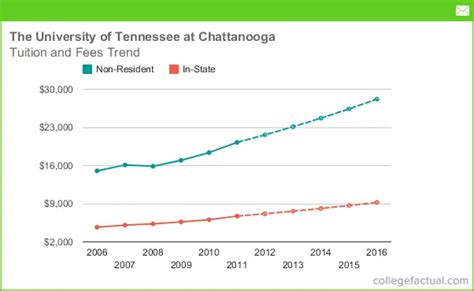The University of Tennessee, a highly esteemed public research university, offers a wide range of academic programs to students from all backgrounds. With its rich history and focus on academic excellence, UT attracts a diverse student body from across the state, the nation, and the globe. However, prospective students often wonder about the cost of attending UT. This article provides comprehensive information about tuition and fees at the University of Tennessee, enabling students to make informed decisions about their higher education plans.

Tuition and Fees for Undergraduate Students
For the 2023-2024 academic year, undergraduate tuition and fees at the University of Tennessee vary depending on residency status. In-state students, who are legal residents of Tennessee, pay significantly lower tuition rates compared to out-of-state and international students.
| Category | Tuition and Fees |
|---|---|
| In-State Undergraduate | $10,764 |
| Out-of-State Undergraduate | $25,854 |
| International Undergraduate | $27,444 |
Tuition and Fees for Graduate Students
Graduate tuition and fees also vary based on residency status and the specific program of study. The following table outlines the estimated tuition and fees for graduate students for the 2023-2024 academic year.
| Category | Tuition and Fees |
|---|---|
| In-State Graduate | $11,976 |
| Out-of-State Graduate | $27,940 |
| International Graduate | $29,530 |
Additional Costs to Consider
Beyond tuition and fees, students should also budget for additional expenses associated with attending the University of Tennessee. These expenses may include:
- Housing: On-campus housing costs vary depending on the type of room and meal plan selected.
- Dining: Students living off-campus or not participating in a meal plan will need to factor in the cost of food and groceries.
- Transportation: Students who commute to campus may incur expenses for gas, parking, or public transportation.
- Books and Supplies: The cost of textbooks and course materials can vary significantly depending on the program of study.
- Health Insurance: All students are required to have health insurance coverage. UT offers a student health insurance plan, or students may choose to purchase coverage from a private provider.
Financial Aid and Scholarships
The University of Tennessee is committed to making higher education affordable for all students. A wide range of financial aid options are available, including scholarships, grants, and loans. Students are encouraged to apply for financial aid by completing the Free Application for Federal Student Aid (FAFSA).
Payment Plans and Deadlines
Students can choose from several payment plans to spread the cost of tuition and fees over a semester. Payment deadlines vary depending on the semester and the payment plan selected. Students should consult the UT Bursar’s Office for more information about payment plans and deadlines.
Conclusion
The University of Tennessee offers a high-quality education at a competitive cost. While tuition and fees are an important consideration, students should also factor in additional expenses and explore financial aid options to make higher education affordable. By understanding the costs associated with attending UT, prospective students can make informed decisions about their academic future and work towards achieving their educational goals.
